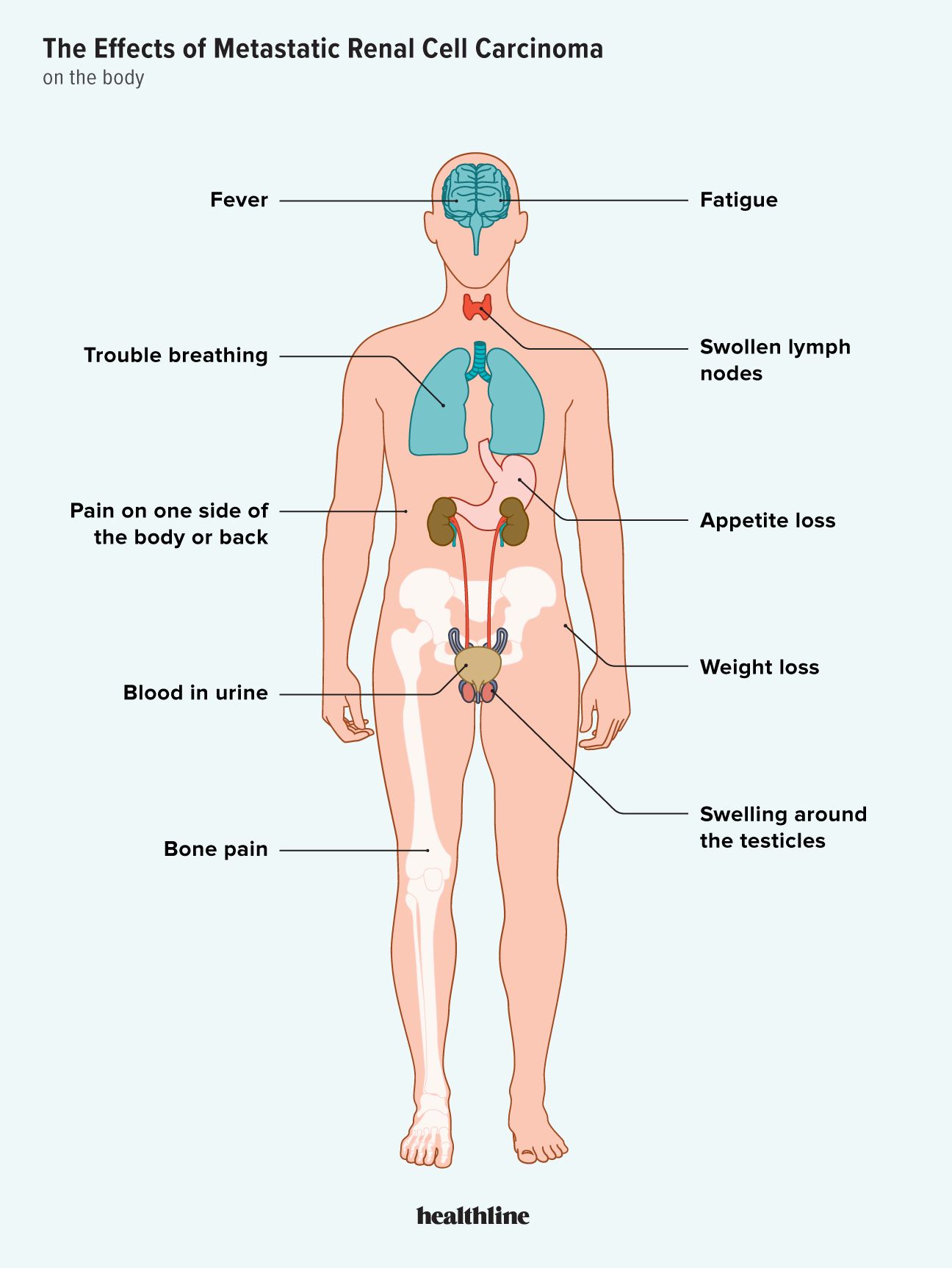Renal cell carcinoma is a type of cancer that starts in the tiny filtering tubes of the kidneys. It can metastasize or spread to the lungs, the brain, and various other parts of the body.

Your kidneys are two bean-shaped organs located near your back. Each day, they filter wastes and extra water from your blood to produce urine.
The kidneys also release hormones that regulate blood pressure and other body functions. Renal cell carcinoma (RCC) can start in the filtering tubes of your kidneys.
From there, it can grow and spread to other body parts.
Cancer can damage the kidney and interfere with its ability to filter wastes out of the blood. One common symptom of renal cell cancer is blood in the urine.
Renal cell carcinoma
It can block the airways, preventing enough oxygen from getting to your body. Symptoms of metastatic renal cell carcinoma in the lung include a cough, shortness of breath, and pain or pressure in your chest.
Renal cell cancer
Cancer in the liver can block the flow of blood and bile. It can lead to symptoms like:
- appetite loss
- weight loss
- jaundice
- nausea
- vomiting
Bone is
The kidneys produce hormones like erythropoietin, which helps make red blood cells, and renin. These regulate blood pressure. Cancer in the kidneys can lead to a lack of enough red blood cells called anemia.
Red blood cells transport oxygen to your body’s tissues. When you don’t have enough of them, you’ll become tired, pale, and short of breath. Renal cell cancer can also release substances that increase your blood pressure.
One of the places kidney cancer
Metastatic renal cell carcinoma
Cancer can spread to the lymph nodes — small glands in areas like the neck, under the arms, and in the groin — that are part of the immune system.
The lymph nodes typically help trap viruses, bacteria, and other foreign invaders. When you’re sick or you have cancer, they can swell up.
Sometimes, renal cell carcinoma
Symptoms of metastatic cancer in the brain include:
- headaches
- seizures
- numbness
- tingling
- weakness
- trouble speaking
As the cancer grows, it can also press on nerves in your back or side and cause pain.
A tumor can block blood flow through veins called the pampiniform plexus inside a male’s scrotum.
The veins become enlarged, which is called a
How long can you live with kidney cancer spread to the lungs and bones?
Without treatment, RCC that has spread to the lungs has a 0–18% 5-year survival rate.
According to a 2019 study of 1750 patients, of which 21% had only bone metastasis, the medial overall survival was 23.2 months.
What happens in the final stages of kidney cancer?
Kidney cancer is divided into four stages. At stage 3, the tumor has usually spread to a major vein, nearby tissue, or to the lymph nodes. By stage 4, it has spread to the adrenal gland, the distant lymph nodes, or other organs.
Learn more about the treatment of stage 4 RCC.
What is the outlook for metastatic kidney cancer?
In general, RCC has a poor outlook. The median survival time is about 13 months, and the 5-year survival rate is
Once renal cell cancer spreads, it is harder to treat, but you still have many options. Doctors treat this type of cancer with surgery, radiation, chemotherapy, biologic therapy, and immunotherapy.
Your doctor will help you choose a treatment based on where in your body the cancer has spread and your overall health.
